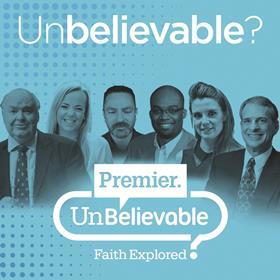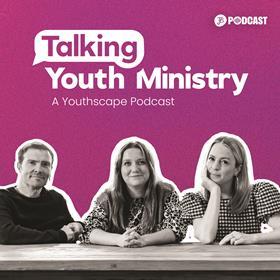From sermon catch-ups to binge-worthy series, the rise of podcasts has redefined how we listen and learn. But is our hunger for constant sound leaving less space for critical thought, creativity…and God?
These days, it seems like everyone is wearing headphones. On public transport; walking the dog; out for a run; doing the housework. I watched a children’s football match at the weekend and the referee officiated the whole thing with one AirPod in. The combination of wireless technology, infinite streaming and a squeeze-it-all-in culture means that far more of our lives are soundtracked than ever before.
A lot of this is musical, of course. The stats suggest we’re all listening to more Taylor Swift and Tchaikovsky: according to the IFPI’s Global Music Report 2025, the average person listens to 20.7 hours of music each week – up from 18.4 hours in 2021. Yet there’s something else glueing those cans and buds to our ears, and despite once being seen as a fad format for listening to on-demand radio, the podcast market has grown beyond all expectations.
Recommendations fill conversations at dinner parties and around the water cooler. Fans struggle to keep up with the relentless release of new episodes; creators continue to tinker with the format in the pursuit of even more listeners, advertisers and paid subscribers. In the UK, one in three adults listen to a podcast every week. Nearly 20 years after they first hit the mainstream, podcasts are bigger than ever.
The (rest is) history
The term ‘podcast’ was coined by The Guardian columnist Ben Hammersley in 2004, to describe the emerging phenomena of audio-blogging that was, at the time, mainly being enjoyed by the tech community. But after Apple added podcasts to its iTunes streaming software in 2005, it went mainstream. An initial blitz of enthusiasm ensued but was then dampened when the distractions of widespread smartphone use and social media overran the world. For a few years, it seemed as if the podcast would go the way of Betamax videos, Google+ and the many other tech innovations that never quite found an audience to match their potential.
Podcasters talk about whatever they want, with whoever they want, for as long as they want
But in 2014, as iTunes continued to populate their platform with nice but not particularly noteworthy shows – many of them re-edits of radio broadcasts – one podcast changed the genre forever. Little-known journalist Sarah Koenig released ‘Serial’, a twelve-part true crime documentary series about a complex 1999 murder case. Created specifically for the format, it found an instant global audience through word of mouth and drew listeners in with its mix of creative storytelling and seemingly unresolved subject matter. Once it was over, and with Koenig nowhere near ready to create a second season, millions of listeners were hungry for more, and began trawling iTunes for other shows to satisfy their appetite.
Podcasts were back, and this time they were cool. From that point on, listening has grown exponentially. Celebrities have leapt at the chance to harvest the opportunities it presents to make money and grow influence. And of course, where mainstream culture leads, the Christian subculture is never far behind. Every megachurch and ministry leader seems to have a podcast now too. *Cough*.
So what’s the appeal?
Part of the joy of new media is that it can be hyper-individualised. If you’re interested in an obscure category of music, baking or fishing…there’s a podcast for you. Fans can make tributes to their favourite TV shows or artists, and people with niche interests can both pursue them and discover a community of people with the same unusual tastes. The long-running novelty pod ‘Whatever Happened to Pizza at McDonald’s’ has so far devoted 376 episodes to answering nothing more than that singular question. Weirdly, it’s well worth a listen.
Look at the various charts, however, and you’ll see nothing very far from the mainstream. In the US, they are dominated by long-form interviewers such as Joe Rogan and Tucker Carlson, while in the UK a familiar two or three-hander seems most popular, with the all-conquering ‘The Rest Is…’ series (owned by Gary Lineker’s Goalhanger group) supplemented by a number of shows fronted by comedians. What sets these apart from their legacy media equivalents is summed up by a simple two-word phrase which means everything to the people behind them: creative control. Whereas old media requires careful adherence to timings and has to run the gauntlet of censorship and keeping advertisers on board, new media makes its own rules. Joe Rogan’s interviews regularly run to more than three hours, and episodes of Steven Bartlett’s inexplicably popular ‘Diary of a CEO’ (or should that be, EGO?) often threaten a similar runtime. Podcasters talk about whatever they want, with whoever they want, for as long as they want.
Another major draw of the podcast is that it provides potentially high-quality content, for free. In a world where we’re getting increasingly frustrated by the number of streaming services required to watch all our favourite TV shows, this feels extremely gratifying. Creators have to make their money more cleverly this way, but the advantage for any niche (or broad appeal) podcast is that an unlimited number of potential listeners are available to them. For anyone seeking to share a message with the world, that’s a very appealing idea. It’s like having a radio station that can theoretically broadcast into every home on the planet.
Unbelievable!
Christians, churches and ministries have not been shy in adopting the format, propelled by the opportunity to take the gospel – or at least their particular brand of it – into all nations. Since any church with a decent sound desk and an internet connection can offer their weekly sermons to a potential audience of billions, many have – with some reporting growth and coming-to-faith stories as a result.
A few Christian podcasters, such as Simon Guillebaud and Justin Brierley, have actually been able to carve out a successful career in content creation. Meanwhile, organisations such as 24-7 Prayer have used web-based audio in creative ways that are helping hundreds of thousands of people to connect with God. Although 24-7’s extraordinarily popular ‘Lectio 365’ content is accessed through a special app rather than via podcast distributors, it absolutely fits the description: specifically created audio content delivered daily to your smartphone. Lectio is a great example of new media enabling Christian faith.
If the next generation of believers are more shaped by unaccountable voices than by their church, what are the implications?
Yet, as with everything, there are some questions for us to consider before universally praising the quiet (podcast) revival. For starters, the very thing that attracts someone like Joe Rogan to make podcasts, and millions to listen to him, is the almost total lack of accountability that he faces in doing so. That’s probably not too damaging when you’re making shows about deleted McDonald’s menu items; it’s a little more of an issue when you’re offering theological teaching. One of my concerns around the current surge in Christian affiliation we’re seeing in the UK is that so much teaching seems to be accessed outside the Church, and often via podcasts and social media platforms. I’m not naive about the shortcomings of local pulpit preaching, but if the next generation of believers are more shaped by unaccountable voices than by their church, what are the implications for our future?
And there is a connected challenge to this: listening to a sermon podcast – a category with an almost incalculable number of entries – is no substitute for attending church and being an active part of a faith community. Yet in our busy world, many of us are regularly making that exchange as a kind of faith-based life hack. Whether that’s listening to your own church’s talks to catch up, or plugging in to a completely different congregation because you like the teaching better, it’s an action which is great on occasion, but problematic as a habit.
(Don’t) pray as you go
There’s one much bigger cultural problem which podcasts feed into, however. It’s the phenomena we witness every time we see an AirPodded dog walker pass us on a beautiful autumn day. We have almost completely eradicated the need for boredom from our lives, and that’s not the win we think it is.
In his excellent book Digital Minimalism (Portfolio Penguin) the American tech writer Cal Newport says we’re now in an age of “solitude deprivation”, in which we no longer have space for silence or undirected time. He describes “a state in which you spend close to zero time alone with your own thoughts and free from input from other minds”.
There are no longer any moments in our lives where we have a chance to do nothing, be completely by ourselves or alone with God
What he means is that thanks to technology, there are no longer any moments in our lives where we have a chance to do nothing, be completely by ourselves or alone with God. Podcasts certainly aren’t the only culprits in this but, unlike social media scrolling, they both fill our time and convince us that they’re a worthy use of it. They help us to feel like we’re utilising every minute of our day by eradicating the otherwise wasted time we might have spent ironing or waiting for a train. Yet these lost opportunities for quiet, thinking and reflection are exactly where we could otherwise be building a spiritual life. These lost moments are where great ideas are hatched, God speaks or our brains just get to rest a little.
Podcasts are great, but, like almost everything else, they’re best enjoyed in moderation and with a bit of wisdom applied. You could listen to them endlessly if you so desired, and never even digest one per cent of the gems available, but the result would be a life entirely bereft of the gift of silence. Their lack of regulation – the very thing which makes them such an opportunity for reaching and persuading other people – should also give us pause. Limits and accountability are good things; so is silence. It’s good to take the headphones off sometimes.
Your next listen…
Whether you’re new to podcasts or a long-term listener, we all need some recommendations from time to time. Here are some of the very best examples of the format

The Rest Is Entertainment/Politics/History
The Goalhanger podcast stable has unleashed a string of hits since 2020, generally pairing two expert hosts to talk about an aspect of a broad-appeal subject. There are rarely guests, and there are rarely bad episodes, as long as you don’t mind the central players. See also: ‘The Rest Is Football’, ‘The Rest Is Politics US’, ‘The Rest Is Money’

Well, they would say that…but the atheist vs Christian debate concept is rock solid and has drawn a huge audience all around the world. Streaming services are filled with sermon content and broad Christian chat, but ‘Unbelievable?’ has earned a reputation for meaty discussions and is worth listening to, purely to strengthen your own apologetics game. See also: ‘Ask NT Wright Anything’

Revisionist History
Not strictly a history pod but, to my mind, the most interesting story-based show out there. Malcolm Gladwell presides and hosts, drawing out fascinating examples of misunderstood moments and misapplied lessons. The latest season focuses entirely on a complex murder within a deeply Christian community in the US. See also: ‘Serial’, ‘Scamanda’, ‘The War Game’, ‘World of Secrets’

The Bible Project
Few teachers or resources have so successfully inspired so many people – from such a broad spectrum of traditions – to dig into scripture than Tim Mackie and Jon Collins’ ‘BibleProject’. This podcast takes listeners deep into the theology behind the teaching series. See also: ‘The Way UK’, ‘Girls Gone Bible’, ‘Turning to the Mystics’

It would be remiss of me not to mention the podcast that I host each week alongside Youthscape’s Rachel Gardner and Lucy Rae. An example of the kind of niche-within-niche broadcasting that pods allow; in this case, offering regular insights to Christian youth leaders. See also: ‘Youth Work State of Mind’, ‘Limitless Youth Ministry’
Enjoy a suite of faith-filled podcasts including Premier Christianity’s The Profile on Premier Plus (also available as an App)






































No comments yet